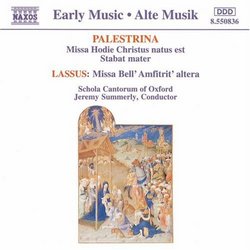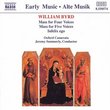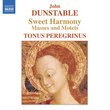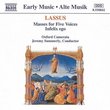| All Artists: Giovanni Pierluigi da Palestrina, Orlande de Lassus, Jeremy Summerly Title: Palestrina: Missa Hodie Christus natus est; Stabat Mater; Lasus: Missa Bell' Amfitrit' altera Members Wishing: 0 Total Copies: 0 Label: Naxos Original Release Date: 1/1/1993 Re-Release Date: 11/25/1993 Genre: Classical Style: Opera & Classical Vocal Number of Discs: 1 SwapaCD Credits: 1 UPC: 730099583626 |
Search - Giovanni Pierluigi da Palestrina, Orlande de Lassus, Jeremy Summerly :: Palestrina: Missa Hodie Christus natus est; Stabat Mater; Lasus: Missa Bell' Amfitrit' altera
CD DetailsSimilar CDs |
CD ReviewsAn excellent CD at any price Sator | Sydney, Australia | 06/12/2005 (5 out of 5 stars) "The coupling of the three works on this recordings does an excellent job of further helping to explode the old myth that Palestrina is more notable for his masses, whereas Lassus' is more notable for his motets. The motet, Stabat Mater, is widely admired as one of Palestrinas finest works. It is a superb example of Renaissance polyphony, massive yet flowing, and always fitting the meaning of the words. The setting builds to a marvellous conclusion on the words to "the glory of Paradise." Palestrina used some of his motets to provide the cantus firmus of his masses. Such a motet and mass, derived from the Magnificat antiphon of Christmas, are sung on this disc in a performance, which is possibly the finest version currently on record, making this an essential Palestrina recording. Tempi and phrasing are superlative throughout making it a great pleasure to listen to. Wonderful though the Palestrina is, the second mass here may be even more strikingly beautiful - although that is entirely a matter of taste. Coupled here is one of Orlando Lassus's finest masses. A composition of exquisite beauty, the Lassus Missa Bell' Amfitrit Altera makes for revelatory listening. Dedicated to Venice (the title's "other Amphitrite" refers to the Greek goddess of the sea), it is one of three great masses for double choir composed by Lassus in succession around 1580. Summerly has a genuine feel for the music of Lassus and this and his other all-Lassus recording on Naxos are some of the finest recordings of this composer's music currently available. The early music magazine Goldberg generously praised this CD saying: 'While all of this music has been recorded several times recently, this disc is competitive with the best.' I wholly agree, for this recording easily surpasses many full-priced competition from far better known rivals. Goldberg further awards this their prestigious five star rating - something that few recording achieve, and to be able to obtain this from Naxos makes it a ridiculous bargain. This has to be one of the hidden gems of the Naxos catalogue." HOW LUCKY WE ARE DAVID BRYSON | Glossop Derbyshire England | 01/23/2004 (5 out of 5 stars) "It must happen fairly frequently, I suppose, that we gain familiarity with European music starting with the 18th or 19th century. It would be more logical surely to start at one end or the other - either backwards from the present day or forwards from some reasonably early stage in the culture. This latter was the way I came to know it myself. My real awakening to classical music came in my early teens, but for years before that I had a close familiarity not only with the 16th century polyphonists but with the mediaeval plainsong. This was not a purely passive familiarity gained as a listener because I had helped (if that was any word for it) in actual performances as a boy treble in my school choir.I certainly remember singing in the Palestrina mass here and in the Stabat Mater: I can't be sure about the Lassus Mass. To me, these two contemporaries are as distinct in their musical personalities as Bach and Handel or as Haydn and Mozart. Interested music lovers without a lifelong background in music of this type may or may not derive some enlightenment from Jeremy Summerly's short liner note, which obviously commands respect as the statement of so distinguished a specialist in the period, but which is still perhaps a little too concerned with telling us how we should evaluate these masters. He makes a good point, if not terribly clearly, when he says `Palestrina's contrapuntal lines are seamless whereas Lassus's voice-leading is frequently disjunct'. For me, that comes down to `Lassus breaks up the vocal line more often', and very strikingly too with antiphonal responses between the parts of a kind that almost anticipate Handel. As a generalisation, inevitably a bit superficial but maybe helpful nevertheless, Lassus is rather more emotional in his idiom than Palestrina. Emotion in Palestrina runs deep but his perfect self-control never fails, even in the profound and depthlessly melancholy Stabat Mater. For me Summerly is more attuned by temperament to Lassus. His renderings have an intense feel to them, and he does not let the music simply drift into our consciousness as Willcocks does in his celestial reading of the great Missa Papae Marcelli, happily still available in a couple of unlikely combinations with other works. I see very little point in elaborate analysis of these great pieces as if they were as familiar as Beethoven's Fifth. The real point to make is that these are distinguished and eloquent performances by distinguished and expert specialists, and that we are still being given the opportunity to educate and edify ourselves by the admirable Naxos organisation, whatever the current economics (reportedly dire) of the classical music business. Summerly is better at the music than at the note-writing, but obviously I am glad of any glimpses into his mind as an interpreter. I'm not quite sure how to take what he says about the harmonies in the Stabat Mater, viz that they are `overtly modal'. This stuff is all modal surely? I can never either remember which mode is mixodorian, hypophrygian or whatever, or even be bothered to remind myself. Harmony is one of the most powerful tools of expression whatever you call it. The text of the Mass is not provided but the Stabat Mater is there with translation. It now seems to me a really powerful piece of degenerate Latin, but be advised that stanzas 7 and 9 as printed here are slightly mispunctuated, the error being carried over into the translation. The difference is only minor, but the full stop should come at the end of the third line in both, as in all the other stanzas. Do the same with the English in both places, and strike out the words `I am' at the start of line 4 of stanza 9.The recording is excellent. I have no wish to hawk Palestrina, Lassus and the divine liturgy in any market place, but I don't know how long we are going to go on getting treasures like this, so I have at least bought the record." Wonderful performances but texts only for Stabat Mater R. Rockwell | Brooklyn, NY USA | 02/27/2003 (5 out of 5 stars) "Even though I am new to early music, I understand that masses have the same texts but my newness requires that I have texts in front of me and this is the only disappointment of the CD.
The two masses are united in their joyful exultation. Palestrina's celebrtaed the birth of Christ which is for Christians is tinged with joy and also a knowledge that Christ will die. The Agnus Dei is tinged with appropriate sadness. Lassus lived during the same time period but in another country. This mass brought tme to tears by the exuberance of the eight voices of the Schola Cantorum of Oxford. Highly recommended performance." |


 Track Listings (12) - Disc #1
Track Listings (12) - Disc #1


